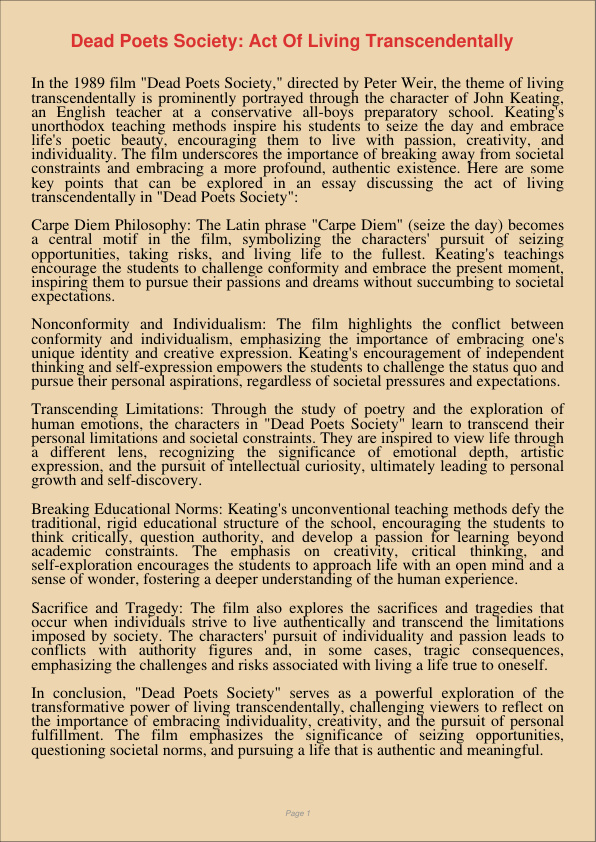Dead Poets Society Act Of Living Transcendentally
Dec 31, 2023
dead poets society
living transcendentally
Visual Arts & Film Studies
Journalism & Communication
In the 1989 film “Dead Poets Society,” directed by Peter Weir, the theme of living transcendentally is prominently portrayed through the character of John Keating, an English teacher at a conservative all-boys preparatory school. Keating’s unorthodox teaching methods inspire his students to seize the day and embrace life’s poetic beauty, encouraging them to live with passion, creativity, and individuality. The film underscores the importance of breaking away from societal constraints and embracing a more profound, authentic existence. Here are some key points that can be explored in an essay discussing the act of living transcendentally in “Dead Poets Society”:
Carpe Diem Philosophy: The Latin phrase “Carpe Diem” (seize the day) becomes a central motif in the film, symbolizing the characters’ pursuit of seizing opportunities, taking risks, and living life to the fullest. Keating’s teachings encourage the students to challenge conformity and embrace the present moment, inspiring them to pursue their passions and dreams without succumbing to societal expectations.
Nonconformity and Individualism: The film highlights the conflict between conformity and individualism, emphasizing the importance of embracing one’s unique identity and creative expression. Keating’s encouragement of independent thinking and self-expression empowers the students to challenge the status quo and pursue their personal aspirations, regardless of societal pressures and expectations.
Transcending Limitations: Through the study of poetry and the exploration of human emotions, the characters in “Dead Poets Society” learn to transcend their personal limitations and societal constraints. They are inspired to view life through a different lens, recognizing the significance of emotional depth, artistic expression, and the pursuit of intellectual curiosity, ultimately leading to personal growth and self-discovery.
Breaking Educational Norms: Keating’s unconventional teaching methods defy the traditional, rigid educational structure of the school, encouraging the students to think critically, question authority, and develop a passion for learning beyond academic constraints. The emphasis on creativity, critical thinking, and self-exploration encourages the students to approach life with an open mind and a sense of wonder, fostering a deeper understanding of the human experience.
Sacrifice and Tragedy: The film also explores the sacrifices and tragedies that occur when individuals strive to live authentically and transcend the limitations imposed by society. The characters’ pursuit of individuality and passion leads to conflicts with authority figures and, in some cases, tragic consequences, emphasizing the challenges and risks associated with living a life true to oneself.
In conclusion, “Dead Poets Society” serves as a powerful exploration of the transformative power of living transcendentally, challenging viewers to reflect on the importance of embracing individuality, creativity, and the pursuit of personal fulfillment. The film emphasizes the significance of seizing opportunities, questioning societal norms, and pursuing a life that is authentic and meaningful.
